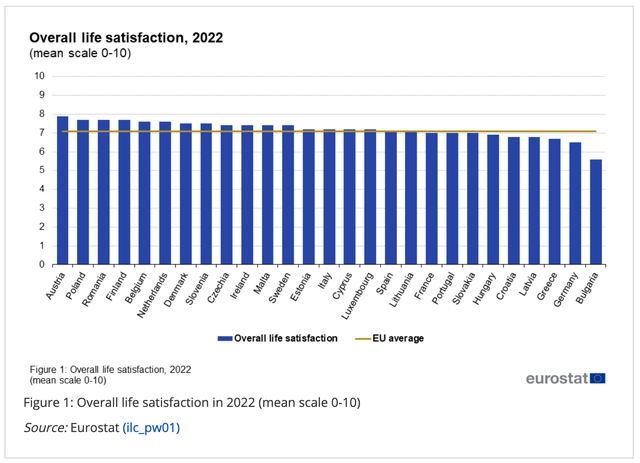![]() Follow Us on Google News
Follow Us on Google News
Austria has secured the top spot as the happiest country in the European Union, according to the latest data released by the EU’s statistics agency.
Scoring an impressive 7.9 out of 10 in Eurostat’s annual “quality of life indicators,” Austria led the 27-member bloc in overall life satisfaction. Poland, Finland, and Romania shared the joint-second position, each recording a score of 7.7 out of 10. Conversely, Bulgaria ranked at the bottom with the lowest score, being the only country to fall below six points (5.6) on the life satisfaction index.

Eurostat’s publication aims to track trends in the subjective well-being of European citizens, highlighting that, on average, EU citizens reported a general satisfaction level of 7.1 out of 10. The survey emphasized that factors like education, family, and financial stability played crucial roles in shaping respondents’ overall life satisfaction, surpassing the influence of mere wealth.
Also read: What is the latest TikTok makeup trend?
The complexity of the relationship between subjective well-being and economic welfare was underscored by the observation that countries with historically lower income levels, such as Romania and Poland, exhibited high levels of life satisfaction. Italy, Spain, and France, despite being among the EU’s largest economies, closely mirrored the continental average with a score of 7.1.
In contrast, Germany, one of the surveyed countries, emerged as one of the least happy nations, surpassing only Bulgaria with a score of 6.5. This marked a decline from its 2021 figure of 7.1. While the study did not pinpoint the cause of the drop in German life satisfaction, it aligned with other polls reflecting a downturn in the country’s overall mood.
A separate survey by the Rheingold Institute in Cologne revealed that only 22% of Germans considered themselves “committed optimists,” while 29% identified as “contented moderates.” Additionally, 20% of adults reported feeling overwhelmed by anxiety, and 9% expressed being “uninterested and withdrawn.” Concerns appeared to be linked to Germany’s economic stagnation, the conflict in Ukraine, and issues surrounding immigration.
































